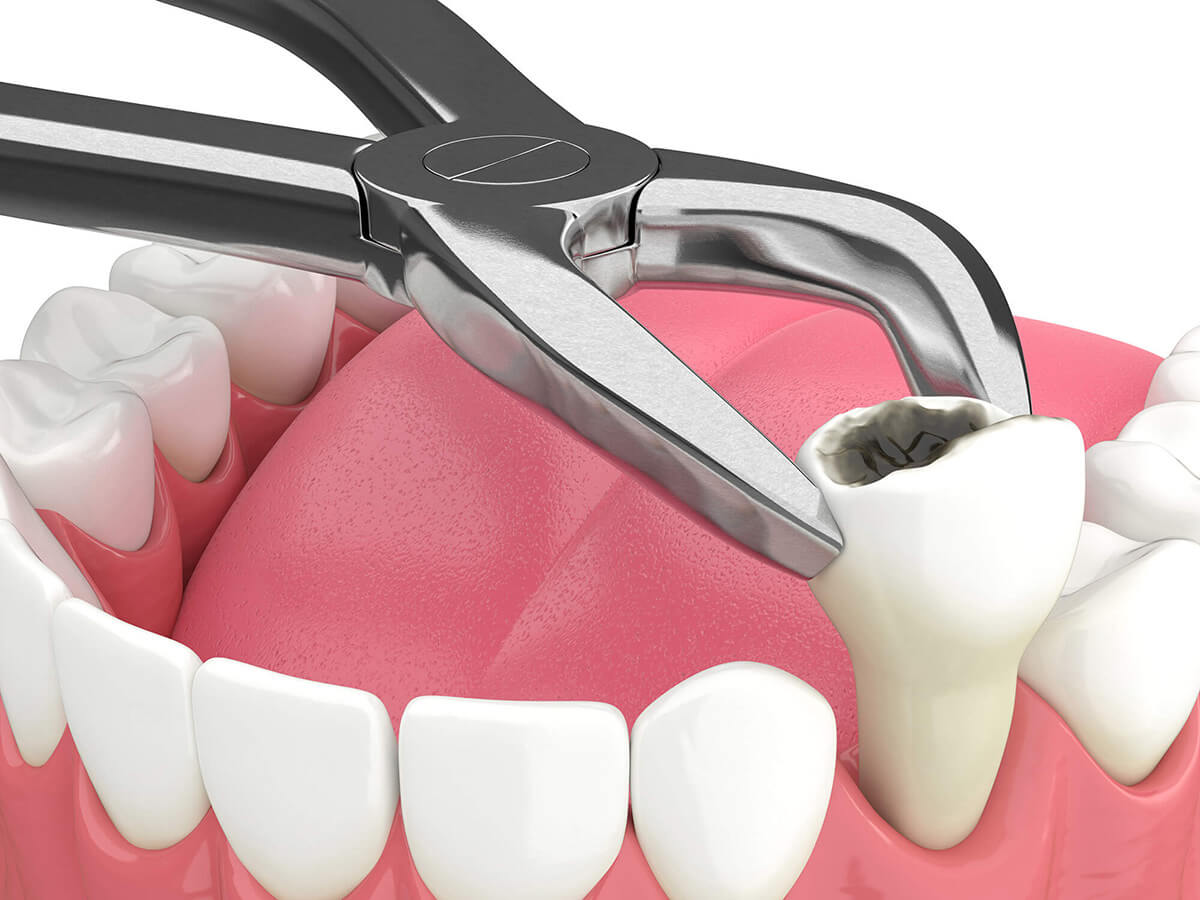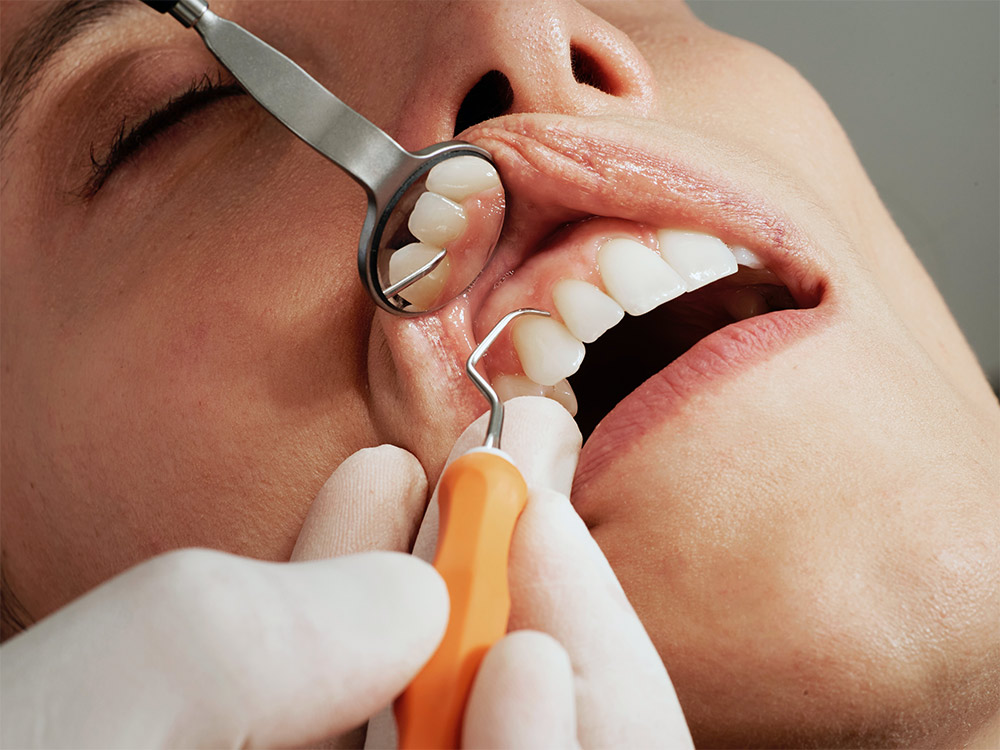Tooth Extractions
While it’s always our goal to care for and maintain your natural teeth, there are cases when removing a tooth is in your best interest. Our Germantown, MD office works to make extractions as easy as possible so you can concentrate on a quick recovery.
Tooth Extraction Process at Suburban Dental
Tooth extraction is typically a speedy process—we will use anesthesia to ensure you’re comfortable. The most critical part of the process is recovery. We must control the bleeding and encourage proper healing immediately after tooth extraction. This involves having you bite down on a gauze pad for 30 to 45 minutes to form a blood clot. Dr. Patrick Kuhn, who typically handles extractions, specializes in dental implants and has five years of experience. That means he regularly extracts teeth from patients of all ages, with every kind of oral health situation you can think of. At Suburban Dental, you can be completely confident that your tooth extraction will be handled by an expert who can ensure you recover as fast as possible while experiencing as little discomfort as possible.

How to Care for a Tooth After Extraction
Immediately after extraction, you must be extremely careful not to disturb the blood clot for 24 hours. To manage the swelling, we recommend an ice pack on the outer cheek and a warm compress to help with discomfort. Gentle rinses, without swishing, with warm salt water also help keep the extraction area clean. Using straws, smoking, vaping, and similar activities that either create suction can dirty the extraction site or suppress healing should be avoided for at least three days. Further instructions will also be provided, and we will happily answer any questions.
What Does a Tooth Extraction Cost?
The cost of a tooth extraction varies depending on whether or not you have insurance and what type of coverage you have. The cost without insurance is typically between $275-$500. Below, you can learn more about our dental membership plan for tooth extractions without insurance and external payment plans.
See Financial Options

-
What are my options for tooth replacements?
There are many options available to you as a replacement after having your tooth extracted, including dental crowns and bridges, dentures, and dental implants. Dental implants are a popular solution due to their natural look, improved ability to eat and chew, and because they are long-lasting and durable. The decision on which option is right for you should always include a discussion with your dentist.
-
How is dry socket prevented after a tooth extraction?
When you have a tooth extracted, you develop a blood clot shortly after the surgery to begin the healing process. If this blood clot becomes dislodged before your mouth has fully healed it can cause pain, this is called dry socket.
Six tips for avoiding dry socket are:
- Avoid straws or anything that creates a suction movement of air and cheek muscles.
- Avoid smoking tobacco as fast inhalation can dislodge your blood clot and the chemicals may prevent healing or cause an infection.
- Eat soft foods only like applesauce, yogurt, and mashed potatoes for the first one or two days.
- Inquire about any medicines you’re taking to ensure they don’t interact with the healing process.
- Use proper oral hygiene to keep your mouth clean and consider an antibacterial mouthwash.
Follow your doctor’s instructions on proper oral care to improve recovery time.
-
When and why are wisdom teeth removed?
Wisdom teeth are the very last teeth to develop, and they grow in the very back of the mouth. In most cases, you will start to feel these teeth emerge when you are in your late teens or early twenties. Almost everyone has these teeth removed since they tend to grow at a severely slanted angle and will likely bump into other teeth and cause crowding. There is also very little space available for these teeth. Ultimately, about 85% of adults end up having their wisdom teeth removed.
-
What causes the need for tooth extraction?
Tooth extraction is the removal of a tooth from its socket in the bone. Teeth extraction usually occurs when a tooth has been broken or damaged by decay and there is too much damage for the tooth to be repaired by a filling or crown.
However, there are other reasons for tooth extraction including, extra teeth growing in that are blocking others, baby teeth that haven’t fallen out in time for the permanent teeth to come in, braces, wisdom teeth that are commonly removed, or medical reasons.
-
How long does it take to heal after a tooth extraction?
The healing time varies but 1-2 weeks is typical. Following proper aftercare instructions will help make sure that your healing time is as short as possible, without complications. Complications like dry socket can increase the healing time which is why it's so important to avoid straws and things like smoking or vaping after your extraction, for example.
-
Do you offer dental sedation for this procedure?
We do not offer sedation but we can refer you to an oral surgeon certified in dental sedation if you decide that you'd prefer it. We'll also refer you to a dentist that offers sedation for extractions if after our initial exam we determine that it really is best for you. We might decide that's the case if it's a complex extraction, such as one that has a higher risk of affecting a nearby nerve. We find that for most patients anesthetics do all that is needed to make them comfortable during an extraction while keeping their cost lower.
More Questions or Ready to Schedule?
Schedule an appointment with us today if you believe you might need a tooth extraction or explore our other dental services.
